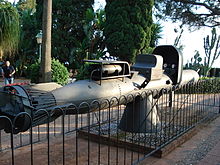The seven from the Great Bear
| Movie | |
|---|---|
| German title | The seven from the Great Bear |
| Original title | I sette dell'Orsa maggiore |
| Country of production | Italy |
| original language | Italian , Spanish |
| Publishing year | 1953 |
| length | 100 minutes |
| Rod | |
| Director | Duilio Coletti |
| script |
Marcantonio Bragadin Giuseppe Berto Francesco De Robertis Ennio De Concini |
| production |
Carlo Ponti Dino De Laurentiis |
| music | Nino Rota |
| camera | Aldo Tonti |
| cut | Gisa Radicchi Levi |
| occupation | |
| |
The Seven of the Big Bear (original title: I sette dell'Orsa maggiore ) is an Italian war film from 1953 about the use of torpedo riders in World War II . The military adviser was frigate captain Luigi Durand de la Penne , whose missions during the war, including the sinking of the battleship HMS Valiant , are alienated in the film. The German premiere took place on November 13, 1953, other performance titles were Hell Raiders of the Deep ( USA ), Human Torpedos ( Great Britain ), Panique à Gibraltar ( France ), Alarma en la flota ( Spain ), Os 7 do Inferno ( Brazil ).
action
Second World War, Mediterranean . The Italian Navy has set up a special unit , the Decima Flottiglia MAS , which is internally named after the constellation "Big Bear". These are so-called torpedo riders ; Divers carrying out sabotage underwater with micro-submarines .
The unit's first deployment will take place in Gibraltar . In the neutral Spanish city of Algeciras , with the help of the agent Marion, who works as a singer in a nightclub, they set up a secret base in an Italian merchant ship. From here the torpedo riders operate against Gibraltar. Although the British try to prevent divers from entering the harbor by constantly bombing the waters of the harbor, they manage to blow up allied merchant ships.
A second mission takes place in Alexandria , where they manage to blow up a British battleship . After the armistice of September 8, 1943 , the unit fought on the side of the Allies . When three members are to be awarded the gold medal for this, a British admiral , whose battleship was sunk in Alexandria, pinned the medals to their chests personally.
criticism
... Submariner wonder weapon commemorative film of western Allied Italy for its frogmen and two-man torpedoes of the Axial Age. The flipper heroes leave Mussolini's belly-dancing spy (Eleonora Rossi) only a few meters of film tape. After the girl's death, the frogmen are as hard as croup steel, tough as leather and otherwise just like tadpoles . In the end, the victorious enemy nevertheless asks "for the honor" of decorating the fabulous enemy. Only inferiority complexes dwell so terribly ... The Italian criticism of La Repubblica , on the other hand, found “strength, tension and efficient semi-documentary underwater recordings”.
Web links
- Seven of the Great Bear in the Internet Movie Database (English)
- Film clip on YouTube
- Movie poster in the French version
Individual evidence
- ↑ Der Spiegel No. 51 of December 16, 1953, p. 41.
- ↑ [1]
